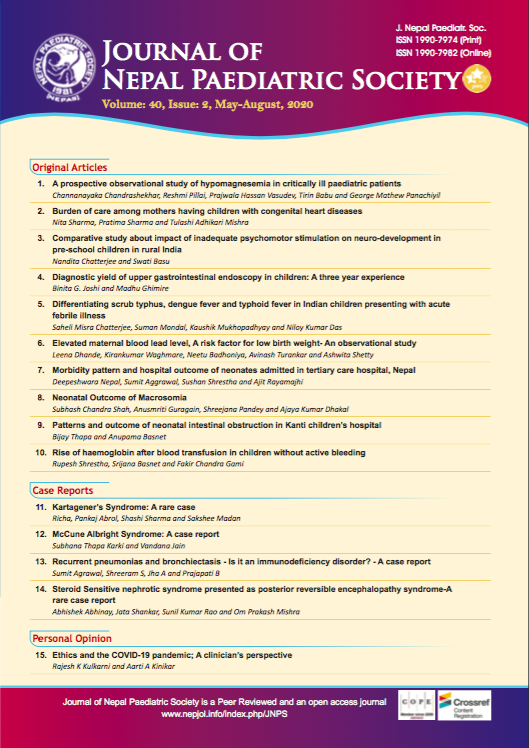Comparative Study about Impact of Inadequate Psychomotor Stimulation on Neuro-Development in Pre-School Children in Rural India
DOI:
https://doi.org/10.3126/jnps.v40i2.29242Keywords:
early childhood development, early intervention, learning opportunity, parental awareness, psychomotor stimulation, responsive careAbstract
Introduction: In a rural, underprivileged community, multiple factors including poverty, non-stimulating home environment and lack of parental awareness about early childhood development and early intervention lead to inadequate ‘nurturing care’ for young children, who with genetic predisposition for typical brain development may not reach their developmental potential. The present study attempts to compare and study the developmental differences between children who had adequate stimulation and those who did not during preschool period.
Methods: Developmental assessment of 51 healthy children, aged 3.5 - 4.5 years with poor psychomotor stimulation (study group) and an age-matched group of 27 children attending pre-school (control group) from the same community was conducted and compared. Developmental screening was done using the DDST II screening tool.
Results: The incidence of developmental delay in the study group was significantly higher; deficits were most marked in personal-social and language domain. Concept of colours, counting objects and drawing were conspicuously absent in most children.
Conclusion: Improving home environment, provision of learning opportunity with available resources, and generation of awareness among parents regarding early child development and early intervention are simple, low-cost measures to improve the developmental trajectory in these children.
Downloads
Downloads
Published
How to Cite
Issue
Section
License
Authors who publish with this journal agree to the following terms:
Authors retain copyright and grant the journal right of first publication with the work simultaneously licensed under a Creative Commons Attribution License that allows others to share the work with an acknowledgement of the work's authorship and initial publication in this journal.
Authors are able to enter into separate, additional contractual arrangements for the non-exclusive distribution of the journal's published version of the work (e.g., post it to an institutional repository or publish it in a book), with an acknowledgement of its initial publication in this journal.
Authors are permitted and encouraged to post their work online (e.g., in institutional repositories or on their website) prior to and during the submission process, as it can lead to productive exchanges, as well as earlier and greater citation of published work (See The Effect of Open Access).



